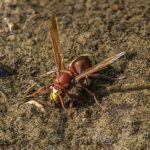
TEL AVIV, Israel — A new study from Tel Aviv University (TAU) has revealed that the Oriental hornet is the only animal in nature capable of consuming alcohol chronically and in high concentrations with almost no negative effects on their health or lifespan.
The research team says, “This is a remarkable animal that shows no signs of intoxication or illness even after ingesting huge amounts of alcohol.”
The research was conducted under the leadership of postdoctoral fellow Dr. Sofia Bouchebti from the laboratory of Professor Eran Levin of TAU’s School of Zoology and Steinhardt Museum of Natural History. The study was published on October 21, 2024, in Proceedings of the National Academy of Sciences of the United States of America (PNAS).
The researchers explain that alcohol is commonly produced in nature through the breakdown of sugars by yeasts and bacteria, primarily found in ripe fruits and nectar. Although alcohol contains nearly twice the amount of energy as sugar, it is toxic to most animals, including humans, with even occasional consumption, and especially with chronic use.
Humans domesticated the wine grape around 10,000 years ago, and compared to other animals, they can tolerate and often enjoy consuming relatively high amounts of alcohol. But alcohol has significant effects on behavior, cognition, and health, with a host of diseases linked to its consumption.
In the new study, the research team tested the Oriental hornet’s ability to consume alcohol and break it down. “The hornets naturally store yeasts in their digestive system, which provides them with a unique environment that allows the yeast to develop and reproduce, creating new strains,” Dr. Bouchebti explains. “One explanation is that hornets transfer yeasts to fruits, which indirectly contributes to the production of wine.
“In our study, we labeled the alcohol consumed by the hornets with a heavy carbon isotope. As the alcohol is metabolized, it breaks down into carbon dioxide, which is exhaled. By measuring the amount of labeled carbon dioxide emitted, we were able to estimate the speed at which the alcohol was broken down.
“The findings were very surprising; we were amazed to see the rapid rate at which the hornets metabolized the alcohol.”
In the next stage, the researchers sought to determine whether the Oriental hornet ever becomes intoxicated. Does increased alcohol consumption affect their behavior, causing aggression or impacting their nest-building abilities?
Here too, the findings were surprising: even when consuming high concentrations of alcohol (80 percent alcohol as the sole source of nutrition) there was no noticeable effect on the hornets’ behavior.
In the final phase of the study, the researchers tested whether alcohol had any impact on the hornets’ lifespan and health. Once again, they were amazed to discover that no differences were found between the lifespan of hornets that consumed only alcohol for their entire lives (three months), and hornets that consumed sugar water.
“To the best of our knowledge, Oriental hornets are the only animal in nature adapted to consuming alcohol as a metabolic fuel,” Professor Levin concludes. “They show no signs of intoxication or illness, even after chronically consuming huge amounts of alcohol, and they eliminate it from their bodies very quickly. While alcohol-related research is highly advanced, with 5.3 percent of deaths in the world linked to alcohol consumption, we believe that, following our research, Oriental hornets could potentially be used to develop new models for studying alcoholism and the metabolism of alcohol.”
*
Preceding provided by American Friends of Tel Aviv University